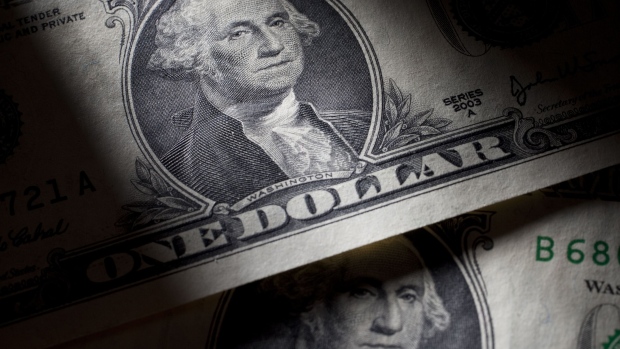Apr 25, 2024
Trump Advisers Discuss Penalties for Nations That Move Away From the Dollar
, Bloomberg News

(Bloomberg) -- Former President Donald Trump’s economic advisers are considering ways to actively stop nations from shifting away from using the dollar — an effort to counter budding moves among key emerging markets to reduce exposure to the US currency, according to people familiar with the matter.
Discussions include penalties for allies or adversaries who seek active ways to engage in bilateral trade in currencies other than the dollar — with options including export controls, currency manipulation charges and tariffs, the people said, speaking on the condition of anonymity.
A verbal backlash against the dollar’s dominance in the global financial system gained traction in 2022, when the US led efforts to impose harsh economic sanctions on Russia, a Group of 20 nation. Russia’s central bank, government officials and some 2,500 other targets have had their access to the dollar restricted.
Read More: Dollar’s Superpower Status at Risk From Turmoil Home and Abroad
President Joe Biden this week signed into law a measure granting him new powers to seize Russian dollar assets to aid Ukraine’s reconstruction. The so-called REPO provision was added to a national security package to assist Kyiv and other US allies. The measure has sparked concern from many Republican lawmakers, who worry it will undermine the role of the US dollar in the global financial system.
Brazil, Russia, India, China and South Africa, together known as the BRICS nations, discussed de-dollarization at a summit last August. That group is gaining global heft after inviting key oil-producing nations Saudi Arabia and the United Arab Emirates, along with others in an expansion move this year. Saudi Arabia and the UAE currently peg their currencies to the dollar.
Economic advisers to Trump and his campaign have talked about targeting that particular BRICS effort in a potential second term. For his part, both publicly and privately, Trump has said that he wants the dollar to remain the world’s reserve currency.
Exchange Rate
“I hate when countries go off the dollar,” Trump said in a March 11 interview on CNBC. “I would not allow countries to go off the dollar because when we lose that standard, that will be like losing a revolutionary war,” he said. “That will be a hit to our country.”
As president, Trump weighed forcibly weakening the dollar to support the domestic manufacturing sector. But now, so far he has privately said he doesn’t currently see the merits of dollar intervention, according to one person familiar with the matter. The Trump campaign referred to the former president’s latest remarks on the dollar Thursday morning.
“With Biden, you’re going to lose the dollar as the standard. That’ll be like losing the biggest war we’ve ever lost,” he said, blaming Biden’s policies for damaging views toward the dollar.
Trump has favored a stable dollar, and for other countries to match that policy by refraining from interventions seeking to devalue their currencies. With the Federal Reserve holding off on lowering interest rates, the dollar lately has been on the rise, spurring authorities overseas to consider interventions to prop up — not devalue — their currencies.
Intervention Issue
Japanese and South Korean authorities have been among those to warn against excessive moves in their exchange rates, with officials in Tokyo cautioning that they reserve the right to intervene.
The yen on Thursday hit the weakest level against the dollar since 1990. Chinese authorities have also taken steps to stem the yuan’s decline.
(Updates with additional details on REPO provision, in the fourth paragraph.)
©2024 Bloomberg L.P.








